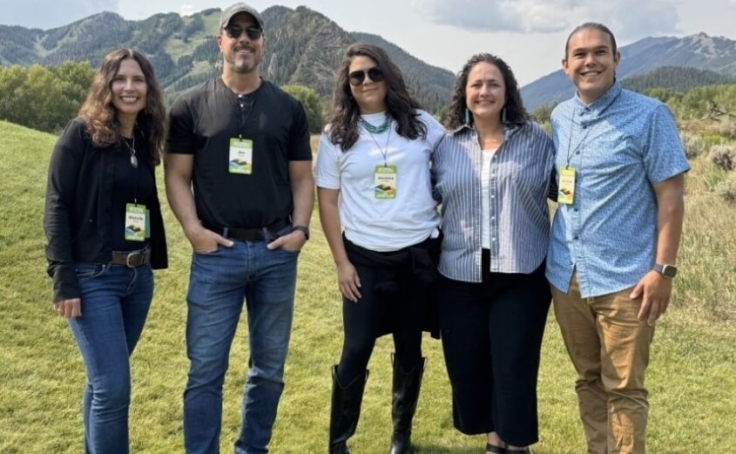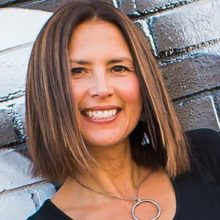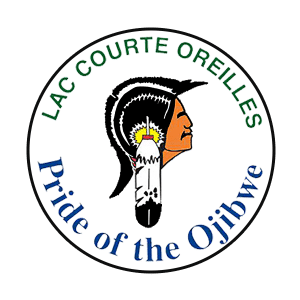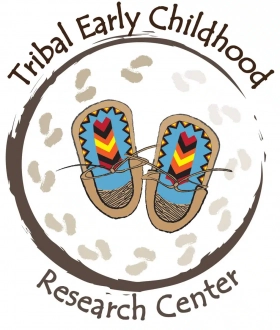Finding My Way Home: Reflections on a Journey into Early Childhood


Michelle Sarche, Ph.D. is an Associate Professor in the Centers for American Indian and Alaska Native Health at the University of Colorado Anschutz Medical Cam…
In honor of Native American Heritage Month, Dr. Michelle Sarche, a professor, researcher, clinical psychologist by training, and Board Member of ZERO TO THREE, reflects on the experiences that shaped her career and lifelong commitment to promoting the wellbeing of American Indian and Alaska Native children and families. Her story is one of connection and the deep meaning of early childhood work.
Relational Roots that Endure
I’m a citizen of the Lac Courte Oreilles Band of Ojibwe Tribe in northern Wisconsin where my grandmother, Rose, grew up.
 My grandmother was born in 1907; the youngest of Adolf LaRonge and Sophie Corbine’s 10 children. She helped raise me for the first year and a half of my life, and the bond we shared then has been foundational since.
My grandmother was born in 1907; the youngest of Adolf LaRonge and Sophie Corbine’s 10 children. She helped raise me for the first year and a half of my life, and the bond we shared then has been foundational since.
My grandmother attended a boarding school for Native American children, one of many created to sever Native children’s ties to their cultures, languages and communities. Boarding schools for Native children were created to “kill the Indian and save the man,” as Captain Richard Henry Pratt infamously said, and to encourage assimilation into mainstream American society. My grandmother carried a lot of pain from her experiences there and then living as a Native woman in the White majority world where she raised her own family.
After I lost her in my early 20’s, I turned to my cultural heritage in an effort to more deeply understand this person that I loved so deeply and missed so much. In doing so, I not only came to better understand her, but came to understand myself. Understanding who I am and where I come from has shaped my personal and professional path ever since.
Finding Meaning through Education
Entering a clinical psychology doctoral program in 1992, I was driven by my desire to understand people and the relational experiences that shape us.
While I had been determined to pursue a PhD in clinical psychology since high school, once in graduate school, I realized that while curiosity and determination could get me far, love for the work would carry me through. It was then that my academic and career path took me home to my Ojibwe heritage. On that path, an enduring connection with my grandmother has been built and a love for serving Native children, families, and communities took hold.
The Power of Relationship
The connections I formed along the way became the foundation for my journey into Tribal early childhood work.
This love for community led me to the University of Colorado Health Sciences Center (as it was called then) to pursue one of the few predoctoral clinical psychology internships nationally focused on Native children and families. Dr. Candace Fleming served as my clinical supervisor and was the first who was also Native and could provide culturally informed supervision. She is not only a friend and mentor to this day – she is also family.
During my internship year, I also met Drs. Paul Spicer and Bob Emde, both longtime ZERO TO THREE Board Members.
Through them and their work with Tribal Head Start programs, my own work in Tribal early childhood development began. When Paul’s career took him to the University of Oklahoma, he passed the leadership of the work he began to me. Though I felt entirely unprepared to take on the role of leading a national center, I accepted the responsibility for ensuring this important work would continue. I’ve learned in life that love gives you the courage to do hard things – and that to me is leadership.
One of the most important lessons I’ve learned in work and life is that growth happens when we step into things that challenge us. By doing hard things, we learn, lead, and serve.
Michelle Sarche, PhD
Its mission is to strengthen this research field through collaboration with early childhood and family well-being researchers, ACF federal staff, and a broad network of ACF-supported and other national initiatives serving AIAN communities.

Building Networks and Strengthening Communities
The Tribal Early Childhood Research Center has been funded since 2005 by the Administration for Children and Families’ Office of Planning, Research, and Evaluation.
Over the last 20 years, it has grown into a large national network of early childhood researchers, program leaders, and federal partners who see the potential for research to support Native American child and family health, wellbeing, and thriving. Through authentic and enduring partnerships, we have built a movement focused on honoring Indigenous wisdom, Tribal sovereignty, and the strength of Native families. Together, we are grounded in the belief that research must follow program and community priorities, not the other way around.
Connection as the Heart of Early Childhood
Over the years, I have come to see my work in early childhood as both a professional and personal calling.
This work is rooted in connection and guided by love for our sacred children, their families, and communities. This work has led me home, time and again – each time, deepening my understanding of the power of Indigenous ways of knowing, being, and understanding for children’s development.
When I think about my grandmother now, I imagine how uplifted she would be to see the vibrant communities and heart-centered people working on behalf of children’s health, wellbeing, and thriving. To everyone who has chosen a career in early childhood: thank you. As my dear friend WJ Strickland, a tireless advocate for all infants, toddlers, and young children, would say, you are engaged in nation building. In all the ways you teach and care for young children, you are impacting lives now and shaping our collective future. We each have a story that got us here. What keeps us here is this story we now share.

